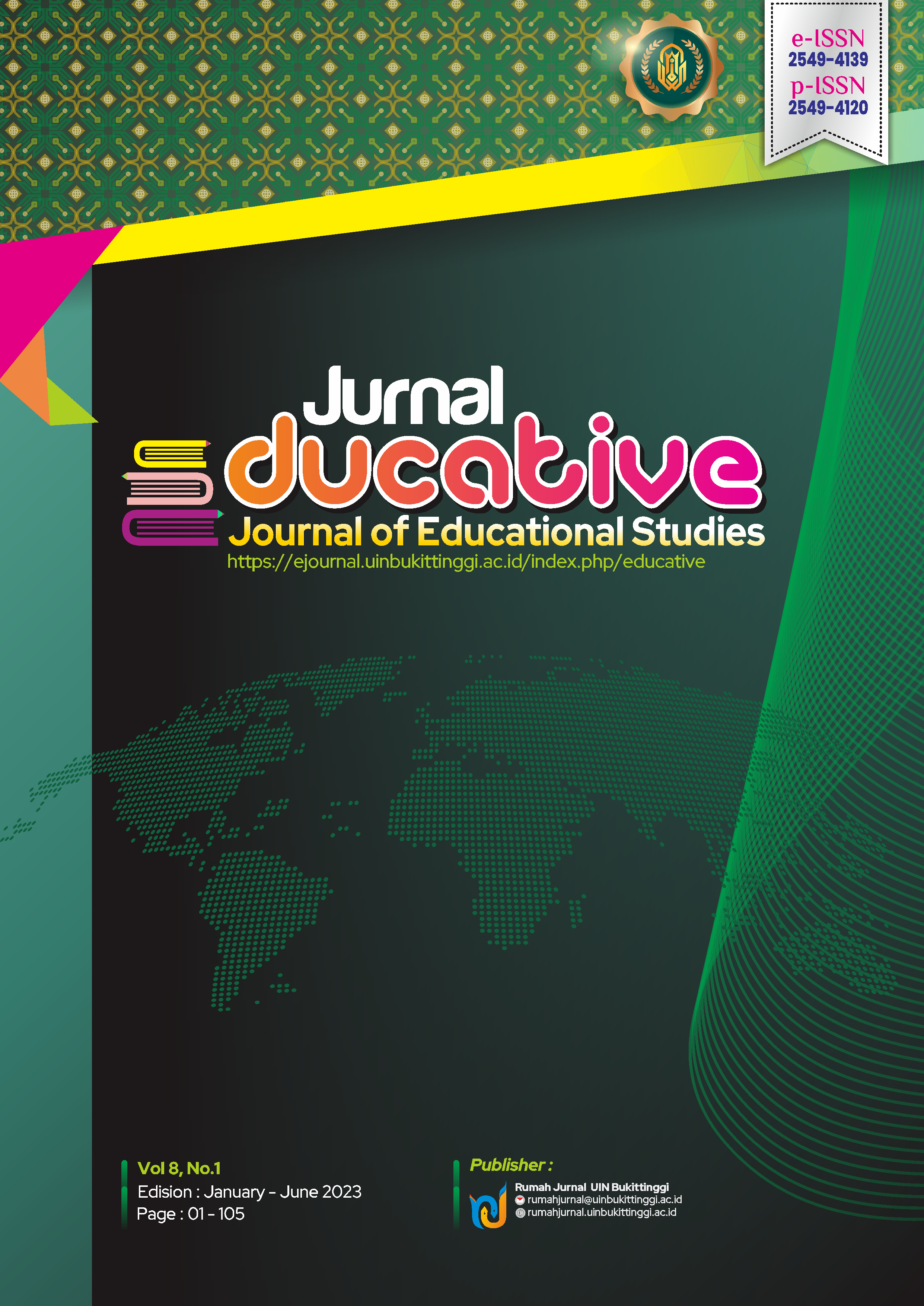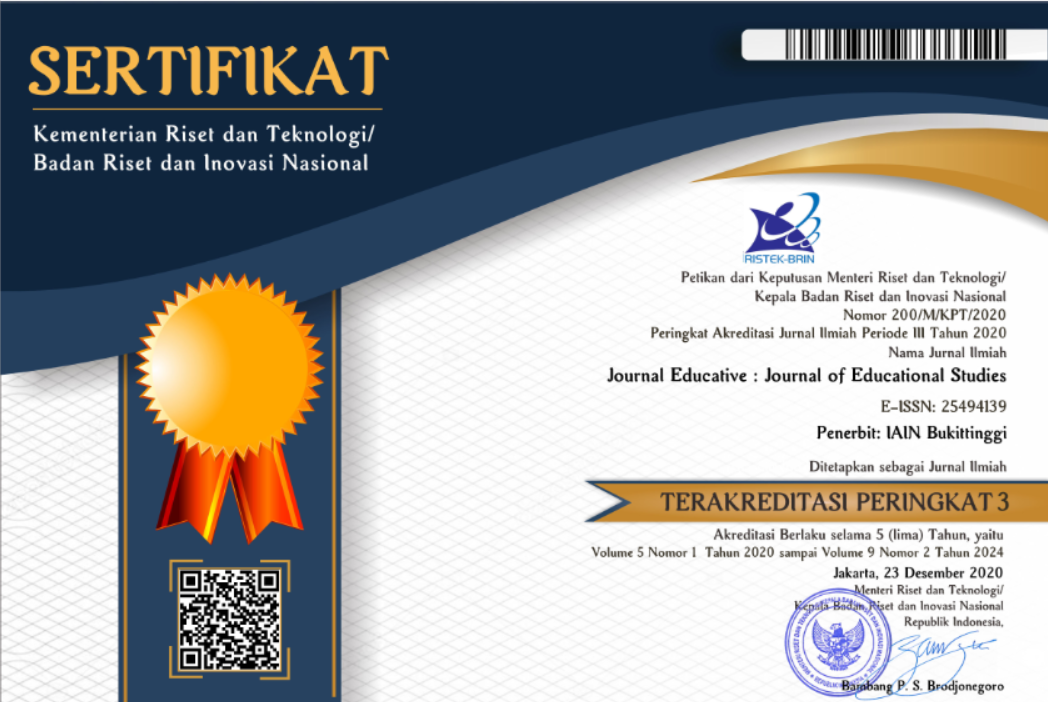The Influence of Principal's Instructional Leadership and Work Motivation on Teachers' Professional Competence
DOI:
https://doi.org/10.30983/educative.v10i1.9392Keywords:
instructional leadership, professional competence, work motivationAbstract
References
Aribowo, A., Su’ad, S., & Madjdi, A. H. (2020). Pengaruh Supervisi Akademik Dan Pelatihan Penelitian Tindakan Kelas Terhadap Kompetensi Profesional Guru Sekolah Dasar Se-Kecamatan Undaan Kabupaten Kudus. Refleksi Edukatika : Jurnal Ilmiah Kependidikan, 10(2), 216–222. https://doi.org/10.24176/re.v10i2.4562
Baumert, J., Kunter, M., Blum, W., Klusmann, U., Krauss, S., & Neubrand, M. (2013). Cognitive activation in the mathematics classroom and professional competence of teachers: Results from the COACTIV project. Cognitive Activation in the Mathematics Classroom and Professional Competence of Teachers: Results from the COACTIV Project, March 2013, 1–378. https://doi.org/10.1007/978-1-4614-5149-5
Bush, T. (2015). Understanding instructional leadership. Educational Management Administration and Leadership, 43(4), 487–489. https://doi.org/10.1177/1741143215577035
Harras, H., Sugiarti, E., & Wahyudi. (2020). Kajian Manajemen Sumber Daya Manusia untuk Mahasiswa. UNPAM Press.
Hendriks, M. A., & Scheerens, J. (2013). School leadership effects revisited: A review of empirical studies guided by indirect-effect models. School Leadership and Management, 33(4), 373–394. https://doi.org/10.1080/13632434.2013.813458
Herman, M., Hidayat, G. T., & Nuryani, L. K. (2023). Implementasi Kompetensi Profesional Guru sebagai upaya Peningkatan Kualitas Pembelajaran. 5, 104–115. https://doi.org/10.51454/jimsh.v5i2.998
Kartono, K. (2014). Pemimpin dan Kepemimpinan. PT. Raja Grafindo Persada.
Kemdikbudristek. (2023). Peraturan Direktur Jenderal Guru dan Tenaga Kependidikan Nomor 2626/B/HK.04.01/2023 tentang Model Kompetensi Guru. In Peraturan Pemerintah (pp. 1–14). Kemdikbudristek.
Rapor Pendidikan SD Negeri Kecamatan Ulujami, Kabupaten Pemalang Tahun 2024, (2024).
Khaeruman, Marnisasah, L., Idrus, S., Irawati, L., Farradia, Y., Erwantiningsih, E., Hartatik, Supatmin, Yuliana, Aisyah, N., Natan, N., Widayanto, mutinda teguh, & Ismawati. (2021). Meningkatkan Kinerja Sumber Daya Manusia Konsep & Studi Kasus. In Bookchapter.
Kurgambekov, M., Momenov, B., & Barbossynova, G. (2025). Developing professional competence in pre-service teachers. Global Journal of Sociology: Current Issues, 15(1), 22–33. https://doi.org/10.18844/gjs.v15i1.9712
Muchroji, M., Rasiman, R., & Abdullah, G. (2021). Pengaruh Motivasi Kerja Guru dan Budaya Organisasi Sekolah Terhadap Kompetensi Profesional Guru Sekolah Dasar Negeri di Kecamatan Tegal Selatan Kota Tegal. Jurnal Manajemen Pendidikan (JMP), 10(2), 243–260. https://doi.org/10.26877/jmp.v10i2.9436
Mulyono, P., Kusumaningsih, W., & Soedjono, S. (2024). Pengaruh Kepemimpinan Kepala Sekolah, Budaya Organisasi, Dan Penguasaan Teknologi Informasi Terhadap Kompetensi Profesional Guru SD Di Kecamatan Bogorejo Kabupaten Blora. Jurnal Inovasi Pembelajaran Di Sekolah, 5(1), 109–117. https://doi.org/10.51874/jips.v5i1.231
Putra, I. W. A., & Negara, I. G. A. O. (2021). Kontribusi Kompetensi Profesional Guru dan Motivasi Kerja Terhadap Kinerja Guru SD. Jurnal Imiah Pendidikan Dan Pembelajaran, 5(1), 95. https://doi.org/10.23887/jipp.v5i1.32253
Robbins, S. P., & Judge, T. A. (2024). Perilaku Organisasi (Organizational Behavior). Salemba Empat.
Rusdiana, & Heryati, Y. (2015). Pendidikan Profesi Keguruan. Pustaka Setia.
So-Oabeb, J., & du Plessis, A. (2023). Leadership competencies for teacher professional development: perspectives of Namibian principals, heads of departments and teachers. Perspectives in Education, 41(2), 16–32. https://doi.org/10.38140/pie.v41i2.7097
Sucitra, D. A., & Thobi, M. (2024). Kepemimpinan Instruksional Kepala Sekolah. PT. Pena Persada Kerta Utama.
Sudiarto, S. (2018). Membangun Motivasi Kerja Guru Dalam Menyiapkan Sumber Daya Manusia Indonesia Yang Berkualitas (Analisis Teori Motivasi Abraham Maslow Di SMK Negeri 57 Jakarta). JENIUS (Jurnal Ilmiah Manajemen Sumber Daya Manusia), 1(3), 307–334. https://doi.org/10.32493/jjsdm.v1i3.1292
Sugiyono. (2017). Metode Penelitian Kuantitatif, Kualitatif dan R&D. Alfabeta.
Sukardi. (2019). Metodologi Penelitian Pendidikan Kompetensi dan Praktiknya. Bumi Aksara.
Sukmawati, C., & Herawan, E. (2017). Kepemimpinan Instruksional Kepala Sekolah, Komitmen Guru Dan Mutu Kinerja Mengajar Guru. Jurnal Administrasi Pendidikan, 13(2). https://doi.org/10.17509/jap.v23i2.5634
Susanto, A. (2018). Manajemen Peningkatan Kinerja Guru: Konsep, Strategi, dan Implementasinya. Prenadamedia Group.
Tsabitah, N., & Fitria, N. (2021). Pengaruh Kompetensi Profesional Guruterhadap Kualitas Pembelajaran Di Raudhatul Athfal Tangerang. Jurnal Anak Usia Dini Holistik Integratif (AUDHI), 1(1), 10. https://doi.org/10.36722/jaudhi.v1i1.563
Undang-Undang Nomor 14 Tahun 2005 tentang Guru dan Dosen. (2005).
Undang-Undang Nomor 20 Tahun 2003 tentang Sistem Pendidikan Nasional. (2003).
Uno, H. B. (2022). Teori Motivasi dan Pengukurannya: Analisis di Bidang Pendidikan. Bumi Aksara.
Usman, H. (2015). Model Kepemimpinan Istruksional Kepala Sekolah. Procedia Manufacturing, 36(22 Jan), 322–333. https://doi.org/10.21831/cp.v3i3.7338
Utami, C. H., & Mutmainnah, S. (2019). Pengaruh Kompetensi Profesional Guru dan Literasi Pelajaran Korespondensi Jurusan Administrasi Perkantoran di SMK Negeri 1 Medan T . P 2018 / 2019. 4(2), 11–22.
Walean, R., Koyongian, Y., & Sabudu, D. (2023). Kepemimpinan Instruksional Kepala Sekolah dalam Meningkatkan Pembelajaran. Jurnal Bahana Manajemen Pendidikan, 12(1), 187. https://doi.org/10.24036/jbmp.v12i1.122781
Werdiningsih, T. A., Nyoman M, N. A., & Soedjono, S. (2023). Pengaruh Kepemimpinan Instruksional Kepala Sekolah dan Kompetensi Profesional Guru terhadap Kinerja Guru Sekolah Menengah Kejuruan. Jurnal Manajemen Pendidikan: Jurnal Ilmiah Administrasi, Manajemen Dan Kepemimpinan Pendidikan, 4(2), 114–126. https://doi.org/10.21831/jump.v4i2.52354
Downloads
Published
How to Cite
Issue
Section
Citation Check
License
Copyright (c) 2025 Lela Iman Ningrum, Widya Kusumaningsih, Soedjono

This work is licensed under a Creative Commons Attribution-ShareAlike 4.0 International License.
Authors who publish with this journal agree to the following terms:
1. Authors retain copyright and grant the journal right of first publication with the work simultaneously licensed under a Creative Commons Attribution License that allows others to share the work with an acknowledgment of the work's authorship and initial publication in this journal.
2. Authors are able to enter into separate, additional contractual arrangements for the non-exclusive distribution of the journal's published version of the work (e.g., post it to an institutional repository or publish it in a book), with an acknowledgment of its initial publication in this journal.
3. Authors are permitted and encouraged to post their work online (e.g., in institutional repositories or on their website) prior to and during the submission process, as it can lead to productive exchanges, as well as earlier and greater citation of published work (See The Effect of Open Access).




